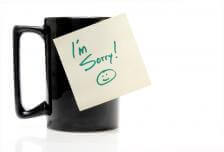Do You Apologize Too Much?
Do women apologize too much? Do you often say “sorry” without thinking? Inspired by Pantene’s “Not Sorry” commercial, The Public Speaker takes a deeper look at the “sorry” situation.
Do women apologize too much? That’s a question that was recently posed in a LinkedIn group that I follow. A new shampoo commercial says yes, they do. What do you think? Do you apologize too much?
Sponsor: Want to save more, invest for the future, but don’t have time to be a full-on investor? Betterment.com helps you build a customized, low-cost portfolio that suits your goals. Learn more by clicking on the following link.

The Pantene shampoo commercial called, “Not Sorry,” portrays a few different “sorry” scenarios. In the ad, a man sits down next to a woman and bumps her elbow on the armrest. “Sorry,” she says, and moves her arm. A woman rushing to get ready for work says, “sorry,” as she hands the baby to the father.
When the question of whether women apologize too much was posted on LinkedIn, it generated some pretty insightful responses. These fell into a few categories:
Yes, Yes, That’s Me!
Many of the female commenters on the LinkedIn article said they recognized their own behavior in the Pantene commercial. Having had this mirror held up to them, most were inspired to watch out for this behavior going forward, and to be more careful with their words.
There’s Nothing Wrong with Being Sorry
A few commenters felt this was a non-issue. They chalked this up to a matter of politeness: If you interrupt someone, you should say sorry. If you nearly hit someone with your grocery cart, you should be sorry.
Saying Sorry and Apologizing are Not the Same Thing
Commenter Susan Rich points out the difference between saying sorry and making an apology. “As a word-nerd,” she writes, “what I find intriguing about this thread is how the word ‘sorry’ is used interchangeably with ‘apology.’ They do not share the same meaning.” She goes on to highlight the 
- apology: a regretful acknowledgment of an offense or failure
- sorry: feeling distress, especially through sympathy with someone else’s misfortune
Susan feels that in a business setting, it’s more appropriate to apologize when you’ve done something wrong. It sounds more professional, and shows that you are taking responsibility. At home, though, “I apologize.” may sound stiff and unemotional, so when it comes to personal relationships, she feels it’s better to say, “I’m sorry.”
We Say “Sorry” When We Mean “Excuse Me” or “That’s Too Bad”

So, Do Women Need to Stop Apologizing?
Judging by all the online comments, the Pantene commercial raises an interesting question. From my personal experience, women do tend to apologize more than men. I know that I have even said “sorry” to our coffee table when I bumped into it! An article on CNN backs this up with two research studies that show that men that are less likely to apologize for small things that inconvenience someone else.
I also agree that apologizing too much weakens our image, and makes the words that follow seem less important. Think about:
Sorry, can I ask a stupid question?
vs.
I have a question about the data you just presented.
A friend of mine told me that when she first started working in the corporate world, she often felt stupid–and she made sure everyone around her knew it. She’d say things like, “I know this is a dumb idea, but…”, or “Sorry, I’m sure I’m the only one who didn’t get that, but could you please repeat it?”
However, in time she realized that the quickest way to make people think you’re dumb is to keep telling them you are.
But Surely it’s OK to Say “Sorry”…Sometimes?
I’m not suggesting the word “sorry” should be eliminated from our professional vocabulary completely. If you are perceived as being highly agentic at work, for example – meaning you are seen as a b * or bully, or are described as “highly independent” or “assertive”–then using “sorry” occasionally could make you seem more conciliatory or more in touch with your employees and co-workers, and could help you create more trust.
In fact, one research study suggests that issuing a superfluous aplogy demonstrates empathic concern fo the receiver, and increases the receiver’s trust in the apologizer. Sorry, maybe I should have shared that information from the start?
Try this exercise for the next week. Each evening, replay the day’s conversations in your head. How many times did you say sorry? What were the circumstances? Did you really mean it? Could you find a more positive, confident way to say what you mean?

This is Lisa B. Marshall. helping you maximize sales, manage perceptions, and enhance leadership through keynotes, workshops, books, and online courses. Passionate about communication; your success is my business. If you want even more success in your life, I invite you to listen to my other podcast, Smart Talk: Inspiring Conversations with Exceptional People.
You May Also Like…






